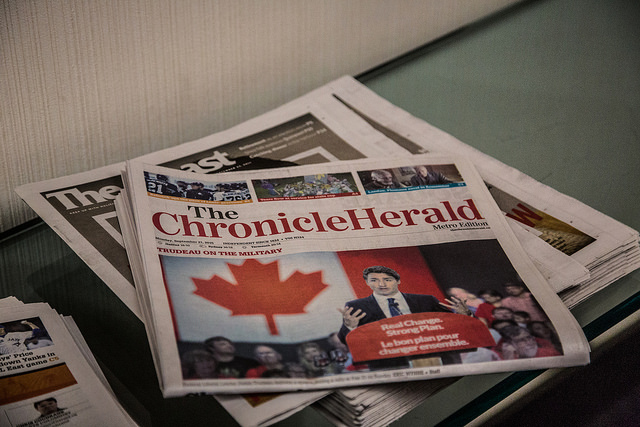Like this article? rabble is reader-supported journalism. Chip in to keep stories like these coming.
Journalists at the Halifax Chronicle Herald are staring down a boss that doesn’t give a rat’s ass about them. They’re facing a lockout. That means that in just over a week, management intends to literally lock the doors and refuse to allow the workers in.
A lockout is an extreme tactic that management uses when it wants to starve workers into accepting a collective agreement that they oppose. It’s their version of going on strike.
Workers aren’t paid when they’re locked out. For workers who have childcare costs, a mortgage, student or other forms of personal debt or car payments, the possibility of a lockout can mean financial ruin.
So you can imagine the rage that one of these workers might feel when a young, plucky journalist comes along and announces that they’re willing to scab: they’re prepared to steal the job of a locked-out worker.
If it were me, once I figured out where to find the money I need for the $90-day daycare that I’m locked into paying for the next three months, I’d be fully pissed. I’d probably caution that young freelancer against scabbing by highlighting potential consequences.
This drama has unfolded online and many young journalists have lined up on the side of the young freelancer. This shouldn’t surprise anyone who spends any time with young journalists. The industry is desperate and cutthroat. For many young journalists that I’ve worked with, if you’re not committed enough to take a pay cut or put up with a bad boss, you don’t want the job badly enough.
Scabbing has been the scourge of labour activists as far back as the late 1700s. When workers are locked out, scabs allow management to keep the business open, to continue to profit or to minimize the impact of an entire workforce being, quite literally, out on the street.
So when you announce that you’re prepared to be a replacement worker, you’re sending the following message: I am willing to damage the bargaining position of my fellow journalists; I am willing to denigrate my reputation for a few extra contracts; I am willing to walk past a mother who’s heart is breaking for her own children’s future because she’s not sure what she’ll do if her job disappears, to get some press clippings.
Young people have mostly been let down by institutions and organizations that should be there to help them. They’re more desperate than ever before and their futures are uncertain. Canadaland reported that this young freelancer said that he has to take the job. He’s desperate.
Here lies the proof that this generation, my generation, has been woefully under educated about how labour relations are supposed to work. Desperation is not an argument in favour of interfering with a collective bargaining process. Your desperation cannot justify making things worse for everyone else (yourself included).
This story has turned focus away from the real culprits of this crisis: governments who download tax breaks for corporations onto the backs’ of students through tuition fees; media companies more interested in making a buck than putting the effort into finding innovative ways to tell compelling and critical stories; corporations who advocate for the full-scale rollback of public services. In none of these circumstances are unions to blame. Quite the opposite: unions are one of the few civil society organizations fighting against these regressive measures.
Being angry with the Halifax Typographical Union (HTU) for being angry at a potential scab is misplaced. If you care about journalism, look at what the employees are actually fighting for. Scabbing means that you side with management and support layoffs, advertorials and fewer industry jobs.
My union, the Canadian Freelance Union, has encouraged freelancers not to scab. Many of the demands that Chronicle Herald workers have made will go beyond helping themselves alone. For example, they are fighting to stop management from eliminating the newspaper’s photography department. How do photojournalist freelancers win when there are fewer good photojournalist jobs in the industry?
Higher industry standards help everyone. Siding with management is simply saying: I don’t care about this fight and I’m willing to take any abuse an employer dishes my way. No wonder your reputation would be damaged.
If media continues to make decisions based on what’s good for a single person, we will lose mainstream journalism as we know it. In fact, it’s that kind of thinking that has lead to the crisis facing the industry today.
More people have died in Canada on picket lines than ever fighting for their right to vote. The struggles against child labour, against seven-day work weeks and for many of the benefits that today apply to all workers through law, were soaked in blood and injury. There is a generation of Canadians who know this. There is a generation of Canadians who don’t.
History is full of stories of resistance and struggle and none of the most important victories were won by someone selling out his class and scabbing for the bosses. The most important victories came when average people gave up some of their personal pride and refused to allow the forces that seek to subjugate them do their worst.
Are you a young journalist who doesn’t feel like you know enough about unions or labour politics? Email Nora and she’ll send you a copy of her book, which explains the basics of unions and unionization in Canada.
Like this article? rabble is reader-supported journalism. Chip in to keep stories like these coming.
Image: Flickr/Tony Webster



